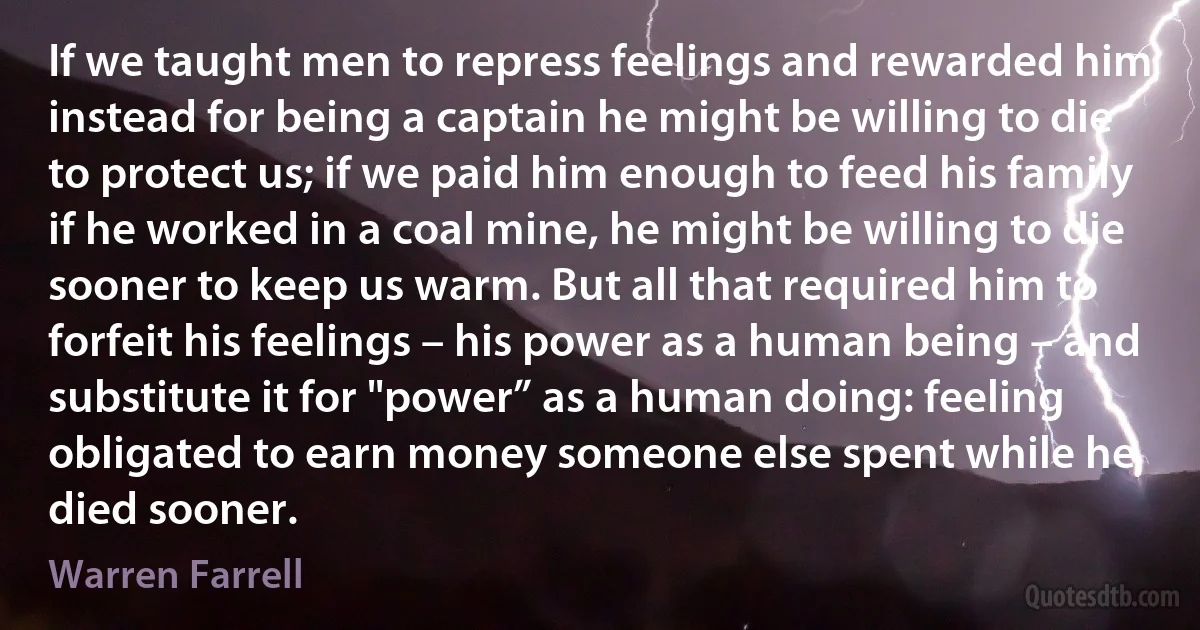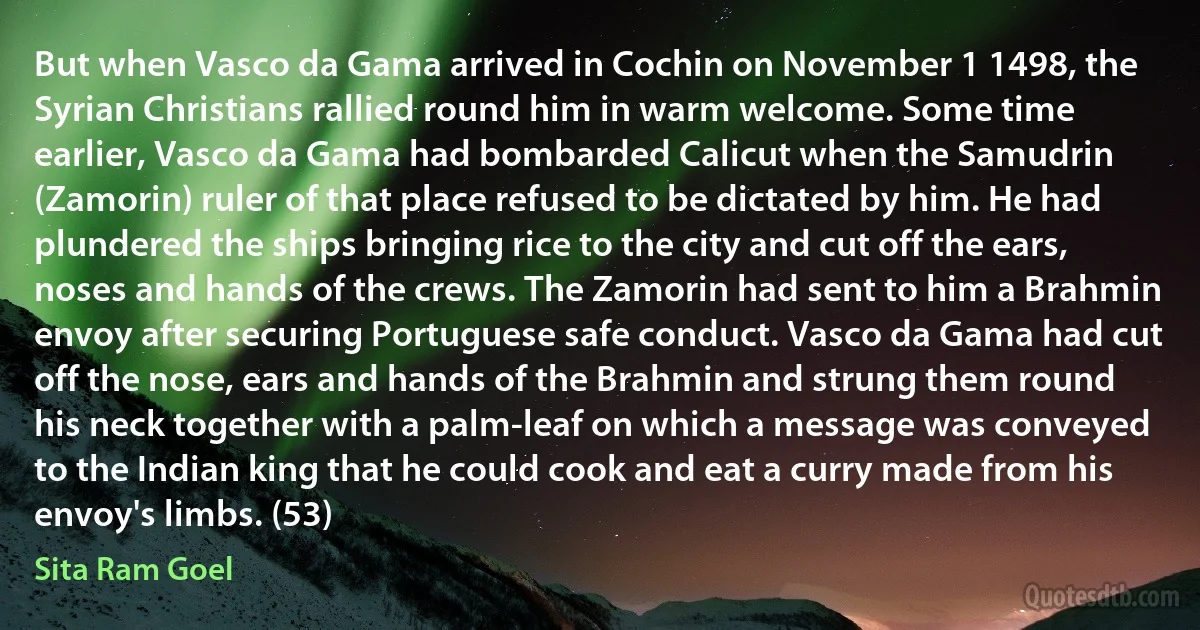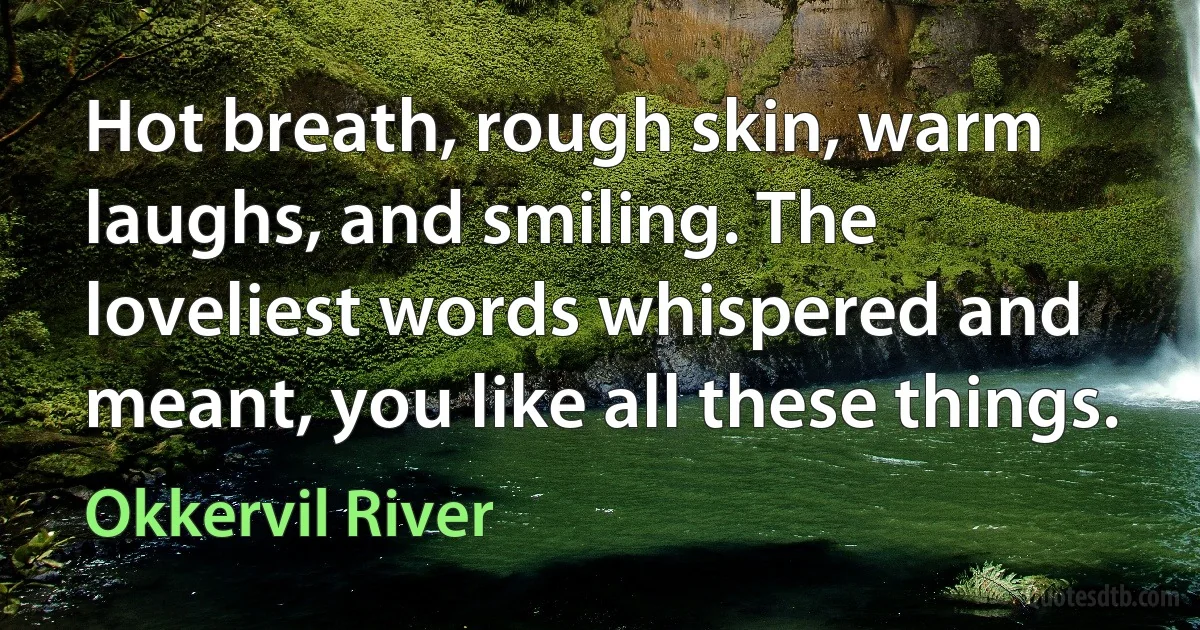Warm Quotes - page 36
I was tired of painting. So many collectors bought paintings and locked them in bank vaults. The stained-glass windows allowed me to make public art.... One day a woman stopped me in the street to talk to me about Champ-de-Mars metro station. "Whether it's sunny, rainy, or snowing, I love your stained-glass windows at Champ-de-Mars. Those big dancing shapes always warm my heart." That woman was neither a collector nor an art critic, but she understood the meaning I meant to give that work.

Marcelle Ferron
There can be no racial animosity, because there are no races. The theorist and feeble thinkers string together and warm over the bookshelf races which the well-disposed observer and the fair-minded traveller vainly seek in the justice of Nature where man's universal identity springs forth from triumphant love and the turbulent hunger for life. The soul, equal and eternal, emanates from bodies of different shapes and colors. Whoever foments and spreads antagonism and hate between the races, sins against humanity.

José Martí
Human flesh, warm and soft and capable of being wounded, went naked up against steel; steel that is cold as old stars, and harder than death and incapable of pain. Bayonets and guns and steel rails and battleships, bombs and bullets are made of steel. And only babies are made of flesh. More babies grow up and work in steel, to hurl themselves against the bayonets, to know the tempered resistance of steel.

Mary Harris Jones
Q: You are said to have very warm relationships with your colleagues. And so I was surprised to read a comment you made in an interview in May with Joan Biskupic of USA Today. You said that when you were a young lawyer, your voice was often ignored, and then a male colleague would repeat a point you'd made, and other people would be alert to it. And then you said this still happens now at conference.

Ruth Bader Ginsburg
Over Christmas we looked through boxes of family pictures and played a game we call 'Find Mom, find Mom's cigarettes.' There's one in every picture. We've got photos of her pregnant, leaning toward a lit match, and others of her posing with her newborn babies, the smoke forming a halo above our heads. These pictures gave us a warm feeling.
She smoked in the bathtub, where we'd find her drowned butts lined up in a neat row beside the shampoo bottle. She smoked through meals, and often used her half-empty plate as an ashtray. Mom's theory was that if you cooked the meal and did the dishes, you were allowed to use your plate however you liked.

David Sedaris
The bestselling poet of 1968 was Rod McKuen, who penned rhythmic little bon mots that he read in a raspy voice suggestive either of emotion or bronchitis. A Hollywood songwriter, clean-shaven with V-neck sweaters, McKuen was a long way from the beats. But by early 1968 he had already sold 250,000 volumes of his unabashedly sentimental verse. His two books, Stanyan Street and Other Sorrows and Listen to the Warm, were selling more than any book on The New York Times fiction bestseller list, although they were not listed, because poetry was not included on bestseller lists. With characteristic self-effacing candor, he said in a 1968 interview, "I'm not a poet; I'm a stringer of words.” When he came down with hepatitis, fans by the hundreds sent him stuffed animals. To many, he and his fans seemed unbearable.

Rod McKuen
There can be no fanatics in the cause of genuine liberty. Fanaticism is excessive zeal. There may be, and have been fanatics in false religion – in the bloody religions of the heathen. There are fanatics in superstition. But there can be no fanatic, however warm their zeal, in the true religion, even although you sell your goods and bestow your money on the poor, and go on and follow your Master. There may, and every hour shows around me, fanatics in the cause of false liberty – that infamous liberty which justifies human bondage, that liberty whose ‘corner-stone is slavery.' But there can be no fanaticism however high the enthusiasm, in the cause of rational, universal liberty – the liberty of the Declaration of Independence.

Thaddeus Stevens
Well, Mondrian is absolute, and is pure, and those are real aspirations of our [American Abstract Expressionism art]. When I say 'pure', I don't mean 'clean' . I don't think Mondrian himself did; I knew him when he was here [New York] during the war. He went to an exhibition by the Surrealist, Tanguy, and was asked what he thought, and he said he would like Tanguy's pictures better if they were dirtier, that for him they were to clean.. .I think he meant that when they were to 'clean', they were essentially lifeless, statuesque, unrevised. As for me, I must say, Mondrian's painting is intensely rhythmic, warm, passionate - restricted as the means ostensibly seem to me.

Piet Mondrian
It is the sun that shares our works.
The moon shares nothing. It is a sea.
When shall I come to say of the sun,
It is a sea; it shares nothing;
The sun no longer shares our works
And the earth is alive with creeping men,
Mechanical beetles never quite warm?
And shall I then stand in the sun, as now
I stand in the moon, and call it good,
The immaculate, the merciful good,
Detached from us, from things as they are?
Not to be part of the sun? To stand
Remote and call it merciful?
The strings are cold on the blue guitar.

Wallace Stevens
The Chinese Government extends its warm congratulations on the convocation of this session and hopes that it will make a positive contribution to strengthening the unity of the developing countries, safeguarding their national economic rights and interests and promoting the struggle of all peoples against imperialism, and particularly against hegemonism.

Deng Xiaoping
The memories of a man in his old age
Are the deeds of a man in his prime.
You shuffle in gloom of the sickroom
And talk to yourself as you die.
Life is a short, warm moment
And death is a long cold rest.
You get your chance to try in the twinkling of an eye:
Eighty years, with luck, or even less."

Roger Waters
..Turner did not believe that colour was reducible to system; and Gainsborough, when painting his 'Blue Boy', seems to have been of the same opinion. I think it was the remark of Mr. Field, when we were looking at that celebrated picture [ Blue Boy ], that Gainsborough's eye was truer than his head, since against his theory he had introduced a sufficiency of warm colours into the flesh tints to balance the predominating cold of the picture.

Thomas Gainsborough
'Triumph, my Britain, thou hast one to show
To whom all Scenes of Europe homage owe.
He was not of an age, but for all time!
And all the muses still were in their prime,
When, like Apollo, he came forth to warm
Our ears, or like a Mercury to charm!
Nature herself was proud of his designs,
And joy'd to wear the dressing of his lines!
Which were so richly spun, and woven so sit,
As, since she will vouchsafe no other wit.

Ben Jonson
The law of revolution is red, fiery, deadly; but this death means the birth of new life, a new star. And the law of entropy is cold, ice blue, like the icy interplanetary infinities. The flame turns from red to an even, warm pink, no longer deadly, but comfortable. The sun ages into a planet, convenient for highways, stores, beds, prostitutes, prisons: this is the law. And if the planet is to be kindled into youth again, it must be set on fire, it must be thrown off the smooth highway of evolution: this is the law.
The flame will cool tomorrow, or the day after tomorrow (in the Book of Genesis days are equal to years, ages). But someone must see this already today, and speak heretically today about tomorrow. Heretics are the only (bitter) remedy against the entropy of human thought.

Yevgeny Zamyatin
Fain would I Raphael's godlike art rehearse,
And show th' immortal labours in my verse,
Where from themingled strength of shade and light
A new creation rises to my sight,
Such heavenly figures from his pencil flow,
So warm with life his blended colours glow.
From theme to theme with secret pleasure tost,
Amidst the soft variety I 'm lost:
Here pleasing airs my ravish'd soul confound
With circling notes and labyrinths of sound;
Here domes and temples rise in distant views,
And opening palaces invite my Muse.

Joseph Addison
When we buy new clothes not to keep ourselves warm but to look "well-dressed" we are not providing for any important need. We would not be sacrificing anything significant if we were to continue to wear our old clothes, and give the money to famine relief. By doing so, we would be preventing another person from starving. It follows from what I have said earlier that we ought to give money away, rather than spend it on clothes which we do not need to keep us warm. To do so is not charitable, or generous. Nor is it the kind of act which philosophers and theologians have called "supererogatory" - an act which it would be good to do, but not wrong not to do. On the contrary, we ought to give the money away, and it is wrong not to do so.

Peter Singer
I have tender feelings for Nixon, because everybody has warm feelings about their childhood. Actually, I didn't like the Watergate trials 'cause they interrupted The Munsters... Nixon was the last liberal president. He supported women's rights, the environment, ending the draft, youth involvement, and now he's the boogeyman? Kerry couldn't even run on that today.

Stephen Colbert



